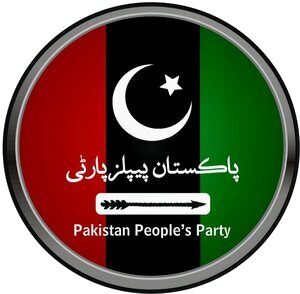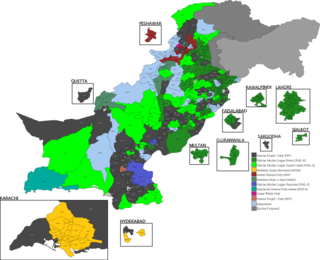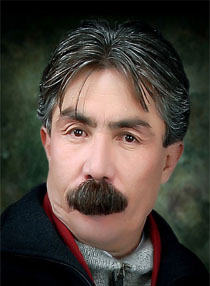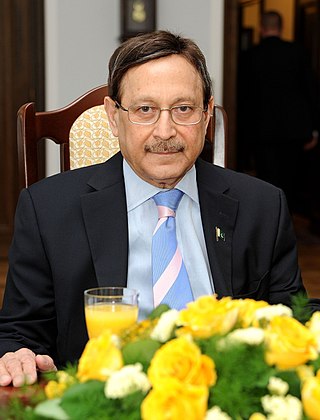Related Research Articles

The Pakistan People's Party is a centre-left political party in Pakistan, currently being the largest in the Senate and second-largest party in the National Assembly. The party was founded in 1967 in Lahore, when a number of prominent left-wing politicians in the country joined hands against the rule of Ayub Khan, under the leadership of Zulfikar Ali Bhutto. It is affiliated with the Socialist International. The PPP's platform was formerly socialist, and its stated priorities continue to include transforming Pakistan into a social-democratic state, promoting egalitarian values, establishing social justice, and maintaining a strong military. It, alongside the Pakistan Muslim League-Nawaz and the Pakistan Tehreek-e-Insaf, is one of the three largest political parties of Pakistan.

Asif Ali Zardari is a Pakistani politician serving as the 14th president of Pakistan since 10 March 2024. He is the president of Pakistan People's Party Parliamentarians and was the co-chairperson of Pakistan People's Party from December 2007 until December 2015.

General elections were held in Pakistan on 18 February 2008 to elect members of the 13th National Assembly and the four Provincial Assemblies.

Bilawal Bhutto Zardari is a Pakistani politician who served as the 37th Minister of Foreign Affairs, in office from 27 April 2022 to 10 August 2023. He became the chairman of Pakistan People's Party in 2007, following his mother's assassination. Bilawal belongs to the Bhutto family, a prominent political family of Pakistan and is the son of former Prime Minister Benazir Bhutto and President Asif Ali Zardari, and the grandson of former President Zulfikar Ali Bhutto. Bilawal had been a member of the National Assembly of Pakistan from 13 August 2018 till 10 August 2023. He re-elected as Member National Assembly of Pakistan in 2024 Pakistani general election from newly formed constituency NA-194 Larkana-I taken oath February 2024.
Events from the year 2008 in Pakistan.

Raja Pervaiz Ashraf is a Punjabi Pakistani politician, businessman and agriculturist who served as the 19th Prime Minister of Pakistan from June 2012 to March 2013 and as the Speaker of the National Assembly from April 2022 to March 2024. Ashraf was a member of the National Assembly of Pakistan from NA-58 (Rawalpindi-II). He has also served as the Senior Vice President of the Pakistan Democratic Movement (PDM), an alliance of political parties opposed to Imran Khan's PTI party.
Fauzia Wahab, was a Pakistani politician who served as the senior ex officio member and the secretary-general of the central executive committee of the Pakistan Peoples Party.
The effort to impeach Pervez Musharraf was an August 2008 attempt by opposition parties comprising the Pakistan Peoples Party (PPP), Pakistan Muslim League (N) (PML-N), Awami National Party (ANP), and Jamiat Ulema-e-Islam to force Pakistan's President Pervez Musharraf out of office. On August 18, Musharraf announced his resignation.

An indirect presidential election was held on 6 September 2008 in Pakistan. The Electoral College of Pakistan – a joint sitting of the Senate, National Assembly and Provincial Assemblies – elected a new president after the resignation of President Pervez Musharraf. As required by the constitution, Muhammad Mian Soomro automatically became acting president on 18 August 2008, upon the resignation of Musharraf. The constitution required that a new president be elected by Parliament within 30 days; Soomro was considered loyal to Musharraf, and it was considered certain that he would be replaced in that election.

The Islamabad Marriott Hotel bombing occurred on the night of 20 September 2008, when a dumper truck filled with explosives was detonated in front of the Marriott Hotel in the Pakistani capital Islamabad, killing at least 54 people, injuring at least 266 and leaving a 60 ft wide, 20 ft deep crater outside the hotel. The majority of the casualties were Pakistanis; at least five foreign nationals were also killed and fifteen others reported injured. The attack occurred only hours after President Asif Ali Zardari made his first speech to the Pakistani parliament. The Marriott was the most prestigious hotel in the capital, and was located near government buildings, diplomatic missions, embassies and high commissions.

Extremely strong and cordial relations exist between Bahrain and Pakistan. Bahrain maintains an embassy in Islamabad and a Consulate-General in Karachi, whilst Pakistan maintains an embassy in Manama. Both countries are members of the OIC and of the G 77.

The Libya–Pakistan relations are the international and bilateral relations between Libya and Pakistan. The relations remain friendly and bonded throughout its history as both countries share similar religious identities, and cultural links, particularly their Islamic heritage. The bilateral relations were established in the 1950s when King Idris agreed to provide financial aid to the then-impoverished Pakistan.

Hussain Ali Yousafi was an ethnic Hazara politician in Balochistan, Pakistan. Yousafi was chairman of the Hazara Democratic Party (HDP) and a member of the Quetta city council. He was assassinated by unknown militants in 2009.

Pakistan–Palestine relations refer to the bilateral relations between Islamic Republic of Pakistan and State of Palestine. The Palestinian Authority established an embassy in Islamabad on 31 January 2017. Pakistan remains a staunch supporter of the proposal for the creation of an independent Palestinian state, and in line with its pro-Palestinian doctrine, does not recognize the State of Israel. However, the former President of Pakistan, Pervez Musharraf, stated that Pakistan will recognize Israel's sovereignty if the latter withdraws its forces from the Israeli-occupied territories and allows an independent Palestinian state to be established within the Green Line that served as the international border between Israel and the Palestinian territories from the First Arab–Israeli War of 1948 to the Third Arab–Israeli War of 1967. Pakistan frequently provides various forms of humanitarian aid to the Palestinian Authority.

Holy See–Pakistan relations are foreign relations between Pakistan and the Holy See. Both countries established diplomatic relations in 1961. The Holy See has a nunciature in Islamabad. Pakistan's embassy in Switzerland is accredited to the Holy See.

Farooq Hamid Naek also spelled Farooq H. Naik, is a Pakistani politician and lawyer, who served as the Chairman Senate, Minister of Law as well as headed the Ministry of Justice in the government led by Prime Minister Yousaf Raza Gillani.
Content from the United States diplomatic cables leak has depicted Pakistan and related subjects extensively. The leak, which began on 28 November 2010, occurred when the website of WikiLeaks – an international new media non-profit organisation that publishes submissions of otherwise unavailable documents from anonymous news sources and news leaks – started to publish classified documents of detailed correspondence – diplomatic cables – between the United States Department of State and its diplomatic missions around the world. Since the initial release date, WikiLeaks is releasing further documents every day.
The Libya Contact Group was an international collective established to support the Libyan National Transitional Council in their effort to overthrow the regime of Muammar Gaddafi in Libya. It was hosted by western nations and members of the Arab League, and known by a variety of other names including the Friends of Libya and the International Contact Group for Libya.

Presidential elections were held on 30 July 2013 in Pakistan to elect the 12th President of Pakistan. Incumbent President Asif Ali Zardari’s term was scheduled to expire on 8 September 2013; and as such, Article 41 of the Constitution of Pakistan required the elections to be held no later than 8 August 2013. The Electoral College of Pakistan – a joint sitting of the Senate, National Assembly and Provincial Assemblies – were tasked with electing a new president to succeed President Zardari, who declined to seek a second term in office. After the Pakistan Peoples Party and its allies boycotted the presidential election, the two candidates were Mamnoon Hussain backed by the Pakistan Muslim League (N), and Wajihuddin Ahmed backed by Pakistan Tehreek-e-Insaf. Agra-born Hussain was elected president by a majority securing 432 votes. The elections were the first time in Pakistani history where a civilian president was elected while an incumbent civilian President was still in office, completing a historic and democratic transition of power that began with the 2013 General Elections.

Indirect Presidential elections were held in Pakistan on 9 March 2024 to select the 14th President of Pakistan, who is the country's head of state.Asif Ali Zardari of the PPP was elected as President, defeating Mahmood Khan Achakzai of the PTI-backed alliance Outgoing President Arif Alvi was eligible for re-election but did not contest for a second term.
References
- ↑ Tomar, Ravi (10 November 2008). "Pakistan after Musharraf". Australian Parliament House. Retrieved 18 October 2020.